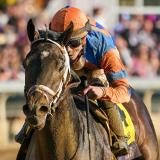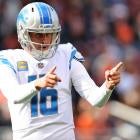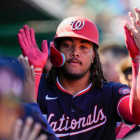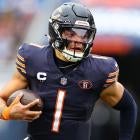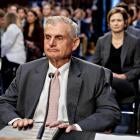WEST POINT, N.Y. -- Many believe no game in American sports has more profound and prideful ties to the American people than Army-Navy. It is the vintage rivalry of our time, the game that remains must-watch for so many despite its on-field relevance within college football being diminished over the past 40 years. But before the era of the Super Bowl and before college football became inundated with two-dozen-too-many bowl games and gargantuan sponsorships and payouts, the Army-Navy game -- for about a half-century -- was the biggest and toughest ticket in all of football.
And in 1963, there was doubt over whether the game could even be played. But it was, becoming one of the most famous college football contests of all time. A crowd of 102,000 filled the stands at Philadelphia's Municipal Stadium. The game ended in controversy, with Navy winning, 21-15. But given the circumstances surrounding the game, and knowing the teams involved, the ending serves as a footnote instead of a stain.
The 1963 Army-Navy game was, of course, the first major college sporting event played after the assassination of John F. Kennedy. We're approaching the 50-year anniversary of that game, held on Dec. 7 -- Pearl Harbor Day -- of 1963. The game was originally scheduled for Nov. 30. But Kennedy's killing on Nov. 22 put a hold on the nation. The legend says that Army-Navy was rescheduled instead of canceled at the behest of Kennedy's widow, Jacqueline.
Rollie Stichweh was the quarterback of that Army team. He maintains that had the referees allowed him to get off the final play from the Navy 2-yard line -- on fourth down, with time running out -- then Army would have won. The gravity of Army-Navy can be found in anecdotes like this: Stichweh served five years in Vietnam after his playing days ended. He was in the famed 173rd Airborne Brigade. Stichweh lost 26 of his classmates to Vietnam, including his best friend, who was in his wedding party.
It was the loss of the president, meanwhile, that served as the backdrop for the '63 contest.
With "JFK" spray-painted in tribute in the end zones between the service academies' names, one of the classics in the series was played on that cold Saturday. JFK was a product of the Naval Academy and a huge sports/football fan. He'd attended the game the year before and was planning to do so again. After his death, this became essentially "his" game. Army and Navy played in honor of him -- and they played for the betterment of the United States.
"We were in transition from genuine grief," Stichweh said of playing the game. "That was our 9/11. I didn't realize the potential impact more broadly than that at the time."
The flashback and importance of the game are detailed in a documentary that will air Thursday night on CBS Sports Network. "Marching On: 1963 Army-Navy Remembered" measures JFK's meaning to the nation, how his death cast a cloud over the country, and how Army-Navy contributed to the healing process.
A screening of the documentary was held at West Point Wednesday night, and I made the trip up there to speak with some of those who participated in that game 50 years ago, as well as current members of the team. It was a powerful experience to sit in a room filled with active cadets -- and to see them interact with veterans in their 60s and 70s.
"I think the rivalry is even more intense today," 1963 Army captain Dick Nowak said.
"Being at war the last 12 years, and fighting as teammates, it means even more today," Army's superintendent, Robert Caslen, said. "What it means when our country is at war ... knowing full well they're standing in the gap between the American people and evil."
Caslen speaks from experience. He watched the 2012 Army-Navy game from a base in Iraq. Caslen has taken two deployments apiece to Iraq and Afghanistan. He hopes no more are coming.
"The rivalry is as intense in downtown Baghdad as it is in downtown Philadelphia," he said.
Stichweh agreed. And in watching the documentary and talking to the cadets and seeing the rivalry continue to matter over the past five decades, he said modern uncertainty with the Middle East has created a respect in this rivalry that is unmatched.
"I think the rivalry is as intense as ever, and in some ways it's even more important than ever," Stichweh said. "The cadets right now, and the midshipmen, they joined their academies knowing we were in war, in Iraq and Afghanistan. Think about that for a moment. When we joined the academies back then we had never even heard of a Vietnam and had no clue to the possible implications."
The win in '63 wound up putting Navy, No. 2 in the nation at the time thanks to Heisman-winning QB Roger Staubach, in the national title game against Texas.
Staubach was scheduled to be on the cover of LIFE magazine as part of the lead-up to the game. The only thing that could, and did, knock him off the cover: a national catastrophe.
The Army-Navy rivalry originated in 1890, and the game has been played every year since 1930. It is the final game in the regular season for college football each year. The 1963 game was also legendary for becoming the first sports telecast to utilize instant replay.
The 114th meeting between the two will be held Saturday, Dec. 14, in Philadelphia. The nature of this rivalry and the threads from '63 connecting to today remain as strong as ever, considering how last year's game ended. With Army facing the longest losing streak in the history of the clash (10 games), the 2-9 Black Knights had the ball in the fourth quarter on the Midshipmen's 14-yard line with just over a minute to go, trailing 17-13.
On what would become the final play of his career, Army quarterback Trent Steelman botched a hand-off. Fumble. Navy fell on the ball. The game was essentially over. Army's losing streak against Navy increased to 11. Steelman was devastated. The first letters Steelman received after the loss -- letters of support and gratitude -- came from the quarterbacks of this game 49 years gone: Rollie Stichweh and Roger Staubach.









